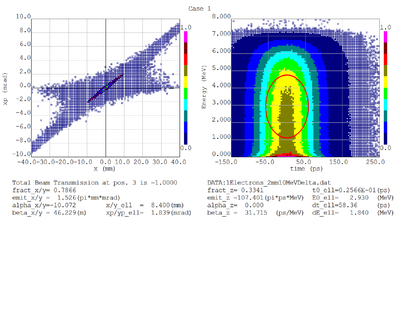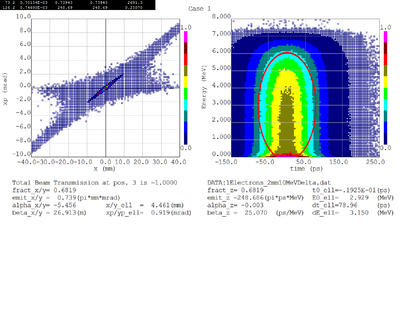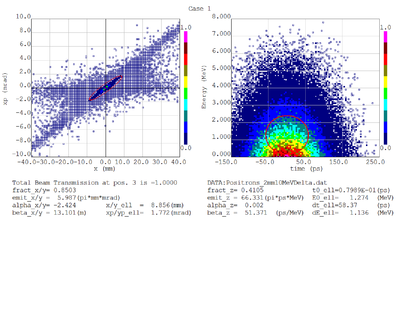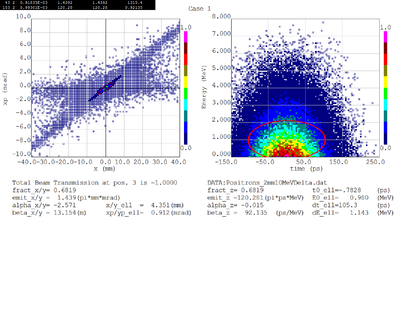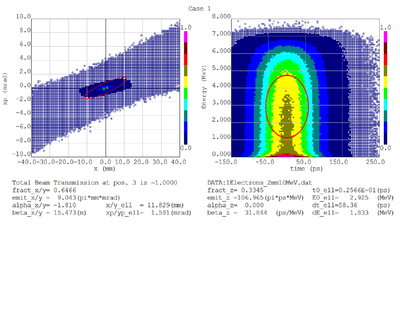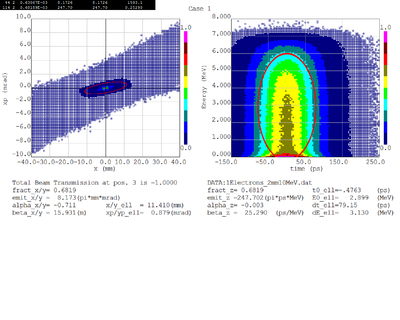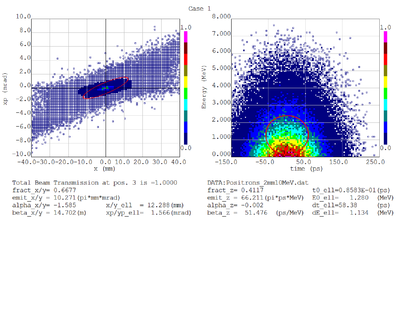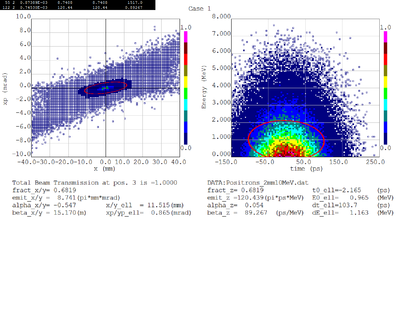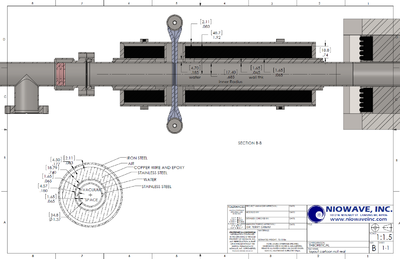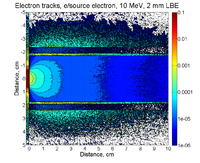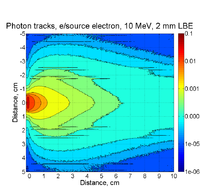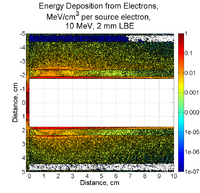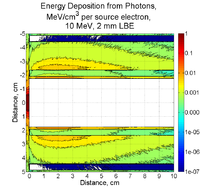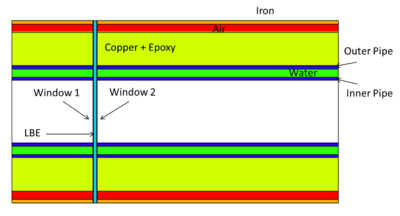Difference between revisions of "G4Beamline PbBi"
| Line 31: | Line 31: | ||
Dmitry's processing of Tony's GEANT simulations showing transverse phase space portrait (left) and longitudinal phase space portrait (right). Phase space portraits show coordinate x or y vs | Dmitry's processing of Tony's GEANT simulations showing transverse phase space portrait (left) and longitudinal phase space portrait (right). Phase space portraits show coordinate x or y vs | ||
diveregense=px/pz or py/pz (or time vs kinetic energy ). Captions show: | diveregense=px/pz or py/pz (or time vs kinetic energy ). Captions show: | ||
| + | |||
1. geometric (not normalized) emittance for transverse and emittance for longitudinal phase space portraits (ellipse areas divided by "pi") | 1. geometric (not normalized) emittance for transverse and emittance for longitudinal phase space portraits (ellipse areas divided by "pi") | ||
| + | |||
2. Twiss parameters | 2. Twiss parameters | ||
| + | |||
3. Ellipse centroid for longitudinal phase portrait | 3. Ellipse centroid for longitudinal phase portrait | ||
| + | |||
4. sqrt(beta*emittance) and sqrt(gamma*emittance) - half sizes of the projections of the ellipses on the coordinate and divergence axes respectively. | 4. sqrt(beta*emittance) and sqrt(gamma*emittance) - half sizes of the projections of the ellipses on the coordinate and divergence axes respectively. | ||
Revision as of 20:31, 13 May 2015
Development of a Positron source using a PbBi converter and a Solenoid
Converter target properties
Definition of Lead Bismuth
1cm diameter target
2 mm thick PbBi
0.5 Tesla solenoid
Desire to know
Emmittance (mrad * mm)
dispersion (Delta P/P) (mradian/1000th mm/1000th)
of electrons after the PbBi target.
pole face rotation in vertical plane.
G4BeamLine and MCNPX
Target thickness optimization
PbBi_THickness_GaussBeam
Dmitry's processing of Tony's GEANT simulations showing transverse phase space portrait (left) and longitudinal phase space portrait (right). Phase space portraits show coordinate x or y vs diveregense=px/pz or py/pz (or time vs kinetic energy ). Captions show:
1. geometric (not normalized) emittance for transverse and emittance for longitudinal phase space portraits (ellipse areas divided by "pi")
2. Twiss parameters
3. Ellipse centroid for longitudinal phase portrait
4. sqrt(beta*emittance) and sqrt(gamma*emittance) - half sizes of the projections of the ellipses on the coordinate and divergence axes respectively.
Electrons - RMS
Electrons - 68.2% core
Positrons - RMS
Positrons - 68.2% core
PbBi_THickness_CylinderBeam
Dmitry's simulations showing transverse phase space portrait (left) and longitudinal phase space portrait (right) for cylindrical beam. Phase space portraits show coordinate x or y vs diveregense=px/pz or py/pz (or time vs kinetic energy )with ellipse - geometric (not normalized) emittance (ellipse area divided by "pi") and Twiss parameters as well as sqrt(beta*emittance) and sqrt(gamma*emittance) - half sizes of the projection of the ellipse on the coordinate and divergence axes respectively.
Electrons - RMS
Electrons - 68.2% core
Positrons - RMS
Positrons - 68.2% core
PbBi_THickness_PntSource
Energy Deposition in Target system (Heat)
MCNPX simulations of energy deposition into different cells are below. There is a slight overestimate (they add up to about 120%). Positrons contribute less than 1% of electrons' contribution. No magnetic filed is assumed.
2mm thick PbBi, 10 MeV, point source
G4beamline pencil beam 10 cm radius
beam ellipse particle=e- nEvents=1000000 beamZ=0.0 beamX=0. beamY=0. \
sigmaX=10.0 sigmaY=10.0 sigmaXp=0.000 sigmaYp=0.000 \
meanMomentum=10. sigmaE=0. maxR=10.
| PbBi Thickness (mm) | #positrons/million electrons (G4Beamline) | #positrons/million electrons (MCNPX) |
| 1 | 1091 | |
| 1.5 | 1728 | |
| 2 | 1902 43 | 1984 |
| 2.5 | 2062 | |
| 3 | 13 | 1986 |
| 3.5 | 1938 | |
| 4 | 39 | 1858 |
| 5 | 1646 | |
| 6 | 37 | 1541 |
| 10 | 1216 |
Solenoid
Inner Radiusu=
Outer Radius =
Length =
Current=
Magnetic Field Map in cylindrical coordinates (Z & R) from Niowave
